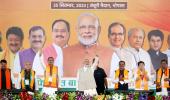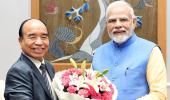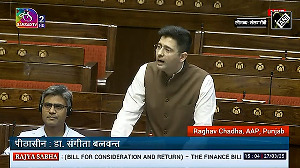For the Mizo people, tribal and family identity are important. But so are jobs, farmers' access to markets, roads, and health facilities for a young population where drugs are a big affliction.

With the election nearing, Mizoram's voters are wrestling with the question of evaluating the five-year tenure of Zoramthanga, the leader of the Mizo National Front (MNF) government.
Recent developments have muddied their judgement.
Earlier this year, violent clashes erupted in neighbouring Manipur between the Meitei and Kuki-Zo communities, resulting in a massive internal displacement of the local population and an influx into Mizoram.
With a population of just over 1.2 million statewide, the sudden arrival of between 12,000 and 20,000 people from a neighbouring state has inevitably impacted Mizoram's politics, economics, and society.
Additionally, there are around 60,000 Chin refugees who sought asylum in India after the 2021 coup in Myanmar.
The state is grappling with the complex issue of providing protection to these newcomers while dealing with the subtle 'outsider' versus 'original settler' debate.
While exact figures are not available, experts in the state suggest that the predominant tribe in Mizoram is the Kuki-Chin.
But tribal loyalty is not the only election issue.

T B C Lalvenchhunga, a retired Indian Navy petty officer turned entrepreneur, is now running for the Aizawl North II seat as a candidate of the Opposition Zoram People's Movement (ZPM).
He expressed concerns about the financial mismanagement of the Zoramthanga-led MNF government, particularly the high debt-to-gross domestic product ratio and low tax revenue generation in Mizoram.
"Over the past four years, the MNF government has incurred a debt of around Rs 5,000 crore. In terms of the absolute own tax revenue, Mizoram generated the lowest revenue among all the North Eastern states in 2020-21 and 2021-22."
According to Lalvenchhunga, the government's spending priorities should focus on sectors that require investment for job creation rather than excessive investments in sports infrastructure.
"Every other day, a new football field is inaugurated. For villages with a small population, the government has spent lakhs on building volleyball courts. Our people need jobs, not sporting activity."
Lalvenchhunga suggests that the MNF is likely to emphasise local nationalism, but for the Opposition, the key issues are corruption, nepotism, and fiscal mismanagement.
There is an unspoken consensus that the state must protect all 'guests', given the strong tribal ties.
But Chief Minister Zoramthanga has gone a step further: Tapping into the vein of traditional Mizo nationalism, Zoramthanga has confided in civil society groups like student groups and local government officials that he was deeply dismayed by what was going on in Manipur and resolved to side with 'our brother and sister Zo'.
This has evoked a strong warning from Manipur CM N Biren Singh, who cautioned Zoramthanga against 'meddling in the politics of a neighbouring state'.
Since July, Zoramthanga has managed a delicate balancing act.
Despite the MNF's alliance with the Bharatiya Janata Party, he has defied the Centre on issues such as the biometric survey of Chin refugees and criticised the Citizenship (Amendment) Act.
He has also opposed the Uniform Civil Code and spoken up for the refugees from Manipur and attacked the Manipur government for 'discrimination'.
C V Lalmalsawmi, a Mizo teaching at the Centre for North East Studies and Policy Research at Jamia Millia Islamia, notes growing fatigue among young and aspiring voters with the MNF.
The emergence of the ZPM in 2017, with its rallying cry of 'a new system, a new people', has replaced the Congress as the principal Opposition.
ZPM is an umbrella party that has subsumed six smaller groups and won eight seats in the outgoing assembly, though all its candidates fought as Independents.
In the current election, 15 of its 39 candidates are under the age of 50.
The football legend of Mizoram, Jeje Lalpekhlua, and gospel singer Vanlalsailova are among them.
ZPM's stock in Mizoram is high, especially after the shock victory it pulled off in the Lunglei municipal council elections in March this year.
The result surprised the party itself: ZPM did not let either the Congress, the MNF, or the BJP get even one seat. It won them all.
For the Mizo people, tribal and family identity are important.
But so are jobs, farmers' access to markets, roads, and health facilities for a young population where drugs are a big affliction.
Says Pu K Sapdanga, working president, ZPM: "Our primary focus is on supporting farmers, with the aim of benefiting taxi drivers, traders, and vendors."
Regardless of the election outcome, Mizoram is signalling that change is on the horizon.
Feature Presentation: Aslam Hunani/Rediff.com













 © 2025
© 2025